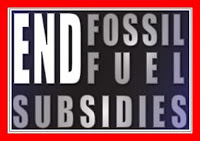The Paris climate deal erases any doubt that fossil fuels will be replaced by renewable energy. Even before the start of COP21, the world had already begun to accept that the end of fossil fuels and the dawn of a low carbon economy powered by renewables. We now have the political will, investment dollars and technological innovation required to drive the transition from fossil fuels to renewables.
In an interview taped for CBS' Face the Nation, John Kerry called the climate pact "a breakaway agreement" that will change how countries make decisions and "spur massive investment." We have already seen how reduced demand and increased supply have resulted in a glut of oil pushing prices to around $36 a barrel. Oil prices have not been this low in more than five years.
A Forbes article titled,
Oil Matters Less than Wall Street Thinks, suggests that oil has not hit bottom and prices will continue to slide, "in the long term, oil can go a lot lower...the demand side trends all point lower." As the article indicates, "oil is fading into history." We are already seeing clear evidence of this trend. In 1980, energy (mostly fossil fuel) stocks were responsible for almost 29 percent of the S&P 500, now they make up less than 9 percent of the total market value of the index.
Fossil Fuels on the decline Post COP21, we can expect to see far more radical disruptions in the fossil fuel industry. Concerns about the risks associated with fossil fuels are driving the shift away from fossil fuels. Specifically, the fear of stranded assets related to unburnable carbon. These concerns are reviewed in a 2013 report titled
Unburnable carbon 2013: Wasted capital and stranded assets from Carbon Tracker and the Grantham Research Institute on Climate Change and the Environment at London School of Economics. The report indicates that between 60 to 80 percent of coal, oil and gas reserves of publicly listed companies are “unburnable” if we are to keep the planet from warming less than 2° Celsius. We currently have five times more fossil fuels that can be safely burned to stay within the 2C upper threshold limit.
Now that the COP 21 agreement has reduced the upper threshold limit to 1.5C, even more fossil fuels will need to stay in the ground. As reported in
Climate Change News, scientists confirm that the 1.5C warming limit means that fossil fuels must be phased-out by 2030. 350.org’s Do the Math campaign says we can emit 565 more gigatons of carbon dioxide and stay below 2°C of warming — anything more than that risks catastrophe for life on earth. We have 2,795 gigatons of carbon dioxide in fossil fuels.
A
new report suggests that there are trillions of dollars of fossil fuel investments that are at risk of becoming worthless. In the article
Global Warmings Terrifying New Math, Bill McKibben quotes John Fullerton, a former managing director at JP Morgan who now runs the Capital Institute, as saying that there are about $20 trillion in fossil fuel assets that are at risk.
Even big oil is coming to terms with the risks associated with their core business activities. ExxonMobil recently published a “Carbon Asset Risk” report in which it acknowledged that climate change will drive down the valuation of its oil reserves. The report shows how market forces and climate regulation will make some of its carbon reserves unburnable.
Concerns about stranded assets used to be an issue of interest to environmentalists, economists and savvy investors. Now the term is informing both private and public policy decisions. Fossil fuel assets will encounter serious headwinds once pollution controls are partnered with carbon pricing schemes. Social and political movements will also contribute to the stranding of fossil fuel assets. This includes growing fossil fuel divestment, environmental advocacy and public protest.
Investors cannot ignore the risks associated with high carbon holdings. Led by organizations like Ceres, investors are becoming increasingly mindful of the dangers associated with traditional carbon laden investments.
As
Jonathan Koomey PhD explained in a 2014 blog post: "[O]nce markets realize there’s an arbitrage opportunity, they relentlessly chip away at it until it is eliminated. And the stranded fossil asset arbitrage opportunity is one that’s worth many trillions of dollars. So the pressure will continue to build, and soon the disclosures will result in attention paid to this asset risk that simply hasn’t been present before. That attention will become a flood very rapidly. It’s the beginning of the end of the fossil-fuel economy, but the big players just don’t realize it yet (or if they realize it, they’re not admitting it)."
A report,
Stranded Carbon Assets (PDF), from Generation Foundation, thinks that the process of transitioning away from fossil fuels will be much quicker than some expect. "The inevitable transition to a low-carbon economy will revolutionize financial markets at an unprecedented magnitude...investors who equate the transition with drawn-out, incremental change do so at their own peril as the stranding of carbon assets may occur at unforeseen rates and at an unpredictable scale." The fall in the costs of renewable energy will also continue to leverage market forces in a way that shifts investment dollars into clean energy, effectively stranding fossil fuel assets.
Growth of renewables Renewable energy is already experiencing tremendous growth and the Paris climate deal will accelerate that growth exponentially. As reported by
Scientific American, studies show that, "switching to an entirely renewable energy system would save money and lives."
Rich and poor nations alike agree that renewables are a cost-competitive source of energy. They are not only good for the climate, they are good for the economy and they provide good jobs. The combination of new policies, new regulations, new investments, new technologies and new partnerships will grow renewable energy at an ever accelerating rate.
Driven in part by the growth of renewable energy, greenhouse gas emissions are already declining in 2015. The
International Energy Agency (IEA) is among those who have provided evidence that the shift towards renewables is happening now. Their annual World Energy Outlook for 2015 report states, “There are unmistakable signs that the much needed global energy transition is under way,” with “60 cents of every dollar invested in new power plants to 2040 [to be] spent on renewable energy technologies.”
The IEA says that between 2015 and 2040, global investments in renewable energy will total $7 trillion, representing 60 percent of all power plant investment. In 2013, renewables contributed only 12 percent of global energy to power generation; however, by 2040 they will supply at least 24 percent.
Contrary to the facetious rhetoric from big oil, renewable energy is powering the growth of the developing world. This includes places like Brazil, China, India, Afghanistan, Albania, the Caribbean, and Costa Rica. The IEA says that the developing world alone will spend $2.7 trillion on renewable-based power plants between 2015 and 2040.
Over the past three decades, renewable sources of energy have been growing at a prodigious rate. In the last three decades, solar power has been doubling every two years while the costs have been falling (75 percent in the last five years). At the current rate, solar will be able to effectively supply all of our energy needs in less than 2 decades.
Solar is seeing tremendous growth in places like Germany, Spain, Portugal, Australia, and the U.S. Wind is seeing tremendous growth in places like Brazil, China, South Africa and the U.S. Growth is also expected with other clean energy sources like biomass, thermal, tidal, and waste-breakdown energy.
A Grist article by Michael Klare titled,
Renewables poised to surge after Paris Agreement, says that "2015 can be viewed as the year in which the epochal transition from one set of fuels to another took off, with renewables making such significant strides that, for the first time in centuries, the beginning of the end of the fossil fuel era has come into sight."
A number of initiatives have been launched at or around COP21 that are not only good for the climate, they represent good business practices.
Indian Prime Minister Modi has pledged to get 40 percent of its electricity from renewable energy by 2030 and 175GW of renewables by 2022. Solar power generation in India is expected to grow by 2,500 percent over the next seven years, expanding output from 4 to 100 gigawatts.
India has brought together 120 countries to be part of a solar energy alliance. Modi has committed $30 million for the establishment of the alliance’s headquarters in New Delhi. The eventual goal is to raise $400m from membership fees and international agencies. Some of the companies involved in the project include Areva, Engie, Enel, HSBC France and Tata Steel. Another solar initiative called the Global Solar Council comprises over 1000 companies.
To accelerate clean energy innovation, several leading countries launched Mission Innovation. Bill Gates and a number of other CEO's are fostering innovation through an initiative called the Breakthrough Energy Coalition. It will seek both private and public funds to expedite the development of advanced green-energy technologies to speed the transition from fossil fuels to renewables. Private sector initiatives like RE100 have dozens of global business leaders who have pledged to source all of their electricity from renewable sources.
Governments see the wisdom of sourcing their energy from renewables. On December 4, 1000 mayors and local leaders signed the "Paris City Hall Declaration" committed to "support ambitious long-term climate goals such as a transition to 100% renewable energy in our communities, or an 80% greenhouse gas emissions reduction by 2050." As explained by Klare:
"As the consumption of renewable energy explodes, the incentives for power and money-saving technical breakthroughs are only going to grow and the rate of discovery is sure to rise as well, undoubtedly offering enormous payback possibilities for those getting a piece of the action early...make no mistake about it: The future belongs to renewables."
While there are some who are skeptical that renewables can replace fossil fuels, a 2014 Washington Post article titled,
The coming era of unlimited - and free- clean energy, makes the point that many megatrends had early detractors who were proven wrong. A
Greenpeace report indicates that 100 percent renewable energy is possible by 2050.
The more renewables that are deployed the more it will reduce costs, which in turn will drive even more growth. Post COP21, we will see an unstoppable shift away from fossil fuels that will augur the unprecedented growth of renewable energy.
RelatedCOP21 Agreement is a Momentous Leap ForwardCOP21 is an Unprecedented Turning Point Market Reaction to COP21 Deal: Fossil Fuels Crash while Renewables SoarSubsidies and Renewable Energy Post COP21 (Infographic) Unpacking the COP21 Paris Climate Agreement (Infographic) The COP21 Climate Deal and the Crucial Role of Obama's Leadership (Video)Republican's Failed Attempts to Undermine the COP21 Climate AgreementHow the Paris Terror Attacks are related to Climate Change and why a COP21 Deal is More Important than EverBreaking: We Have a Final Draft Climate Agreement at COP21 Environment and Climate in the Republican Spending Bill: Oil Exports in Exchange for Clean Energy, Air, Water, and Green Climate FundingAs We Near the End of COP21 People are Demanding Climate Action Optimism at COP21 Despite Disagreements on the Meaning of Differentiated Responsibilities Being Hopeful About the COP21 Climate Deal (Video)Canadian Leadership at COP21COP21 Compact of States and Regions Pledges Emissions Reductions Equivalent to China's Annual OutputBe Part of History: Help Make COP21 a SuccessA Guide to COP21 and Clean Energy Solutions from 24 Hours of Reality and Live Earth (Video) Al Gore Says COP21 Will be a Turning Point in Global Policy (Video) COP21 and Stranded Fossil Fuel AssetsCOP21 History and Guides COP21 Starts With Pledges of Action from World LeadersPresident Obama's Address at the Opening Session of COP21Everything You Need to Know About COP21 (Video) Tell World Leaders that we Want Bold Climate Action at COP21 (Video) COP21: March4Me (Video)Canadian PM and Provinces Unified for COP21Summary of the Final Round of Climate Talks Before COP21Saudi Arabia is on the COP21 Naughty ListCOP21 Naughty List: Republicans Presidential Contenders


















